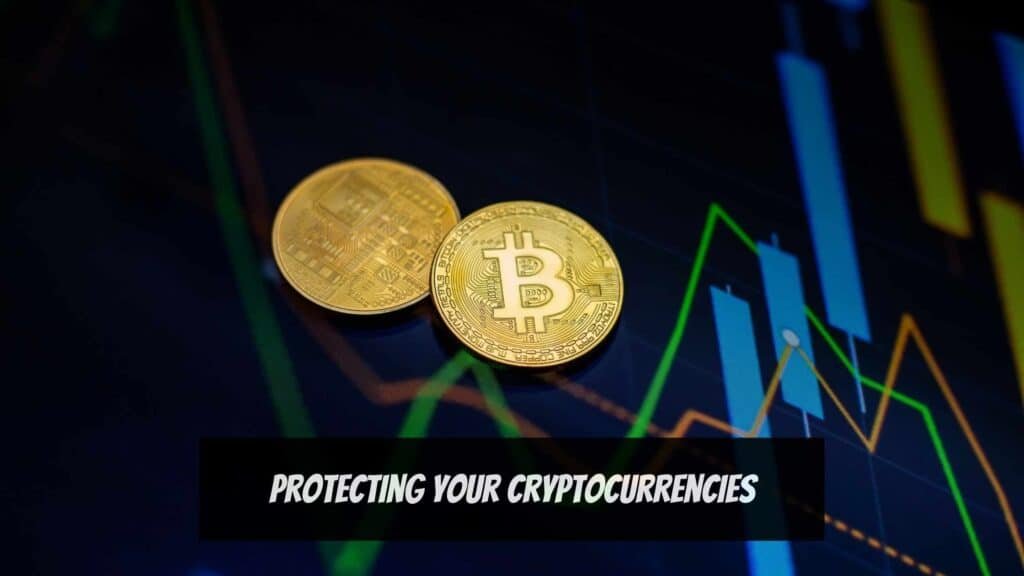Buying cryptocurrency is exciting, but it’s also risky.
There are hacks almost every day, and new ways to steal coins appearing all the time.
So how can you protect your cryptocurrencies?
In this blog post, we’ll give you some tips on how to keep your coins safe.
Make sure to read this post all the way to the end, you might learn something new!
How to Protect Your Cryptocurrencies

1. Keep your private keys safe and secure
Your private keys are what grant you access to your cryptocurrencies, so it is important to keep them safe and secure. There are a number of ways to do this, including physical storage devices like USB drives and hardware wallets, as well as software-based solutions like paper wallets and brain wallets.
2. Use a strong password
In order to protect your cryptocurrencies, it is important to use a strong password that cannot be easily guessed or brute-forced. A good password should be at least 8 characters long and contain a mix of uppercase and lowercase letters, numbers, and special characters.
3. Enable two-factor authentication
Many exchanges and wallets offer the option of enabling two-factor authentication (2FA). This adds an extra layer of security by requiring you to enter a code from your phone or other device in addition to your password in order to login.
4. Use a trusted wallet
When choosing a wallet for your cryptocurrencies, it is important to select one that is reputable and has a good track record. There are many different types of wallets available, so be sure to do your research before selecting one.
5. Avoid phishing scams
Phishing scams are common online threats that attempt to trick you into giving up your personal information, such as your login credentials or credit card number. Be sure to only visit trusted websites and never enter sensitive information into an unsolicited email or pop-up window.
6. Keep your software up to date
It is important to keep all the software on your computer up to date in order to patch any security vulnerabilities that may be present. This includes both your operating system as well as any wallets or exchanges you are using.
7. Don’t store all your coins in one place
If you have a large amount of cryptocurrencies, it is generally not advisable to store them all in one place. Instead, spread them out across different wallets and exchanges so that if one is compromised, you will still have access to the others.
8. Use a secure connection
When accessing your account on an exchange or wallet website, be sure that the connection is secure by checking for the https:// prefix in the URL and looking for the green padlock icon in your browser’s address bar.
9 . Don’t forget about offline storage
In addition to online storage options like wallets and exchanges, you can also store your cryptocurrencies offline on devices like USB drives or hardware wallets. This can offer increased security as it makes it much more difficult for hackers to access your coins.
10 . Monitor transactions closely
Finally, it is important to monitor all transactions closely in order to spot any suspicious activity quickly. This includes maintaining records of all transactions made as well as regularly checking balances and account activity logs.
How to Protect Your Cryptocurrencies – The Conclusion

With the number of cyber attacks on the rise, it’s more important than ever to take steps to protect your cryptocurrencies.
While there’s no guaranteed way to prevent all attacks, there are some basic measures you can take to make it more difficult for hackers to steal your coins.
First, never store your coins on an exchange or online wallet.
Exchanges are constantly target of hacking attempts, and online wallets are also vulnerable to attack.
Instead, store your coins offline in a hardware wallet or paper wallet.
Hardware wallets are the most secure option, but they can be expensive. Paper wallets are a good middle ground, as they’re relatively cheap and easy to set up.
Just make sure to keep your paper wallet in a safe place, as it is susceptible to physical damage.
Finally, always use strong passwords and 2-factor authentication whenever possible.
By taking these precautions, you can help ensure that your coins stay safe from theft.
I hope this article was helpful in teaching you how to protect your cryptocurrencies. If you have any questions, please feel free to leave them in the comments below. Thanks for reading!
